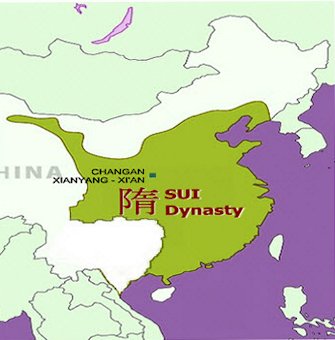
|
Era of Disunity 16. Sui Dynasty
The Sui dynasty was a short-lived imperial
dynasty of China of pivotal significance. The Sui unified the Northern and
Southern dynasties and reinstalled the rule of ethnic Han Chinese in the entire
China proper, along with sinicization of former nomadic ethnic minorities
within its territory. It was succeeded by the Tang dynasty, which largely
inherited its foundation.
A lasting legacy of the Sui dynasty was the Grand Canal. With eastern
capital Luoyang at the center of the network, it linked the west-lying capital
Chang'an to the economic and agricultural centers of the east towards Hangzhou,
and to the northern border near modern Beijing. While the pressing initial
motives were for shipment of grains to the capital, and for transporting troops
and military logistics, reliable inland shipment links would facilitate
domestic trades, and the flow of people and cultural exchange for centuries.
After a series of costly and disastrous military campaigns against the Korean
kingdom of Goguryeo ended in defeat by 614, the dynasty disintegrated under a
series of popular revolts culminating in the assassination of Emperor Yang by
his ministers in 618. The dynasty, which lasted only thirty-seven years, was
undermined by ambitious wars and construction projects, which overstretched its
resources. Particularly, under Emperor Yang, heavy taxation and compulsory
labor duties would eventually induce widespread revolts and brief civil war
following the fall of the dynasty.
Return to 7. Era of Disunity Choices
|
